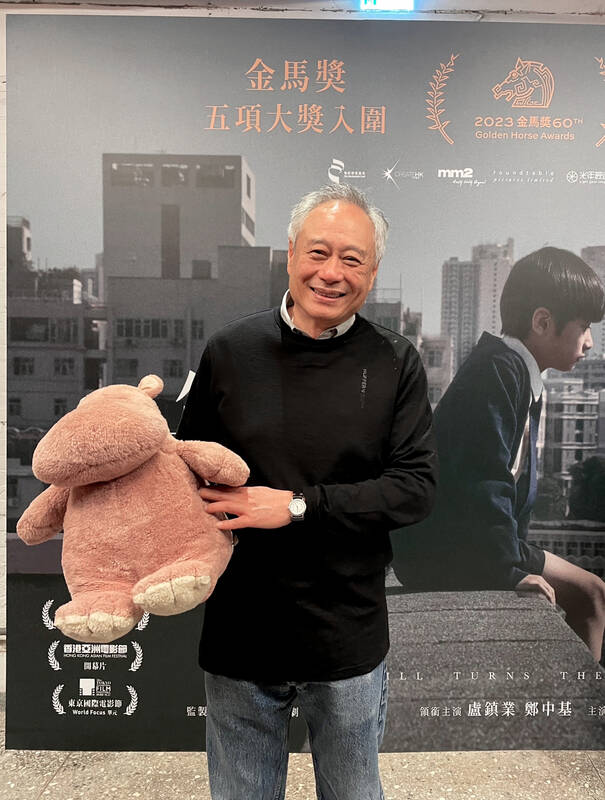Ang Lee (李安) yesterday became the first Taiwanese director to be honored with a Praemium Imperiale award and is to attend the awards ceremony in late November, the event organizers said.
The Praemium Imperiale, inaugurated in 1988, is an international art prize. Since 1989, the Japanese imperial family has presented the awards on behalf of the Japan Art Association.
A panel of internationally renowned individuals, including former Italian prime minister Lamberto Dini, University of Oxford chancellor Chris Patten, Goethe-Institut president Klaus-Dieter Lehmann, former French prime minister Jean-Pierre Raffarin and former US secretary of state Hillary Rodham Clinton, made the nominations, which the association reviewed and picked final candidates.

Photo: Hsu Shih-yin, Taipei Times
In addition to Lee, who won the prize in the film sector, other winners include Japanese architect Shigeru Ban, French installation artist Sophie Calle, Colombian visual artist and sculptor Doris Salcedo, and Portuguese pianist Maria Joao Pires.
Ban was nominated for his contributions to the creativity and innovativeness of architecture by using paper as material to build shelters and temporary residences for natural disaster victims
Lee enjoys significant status in Japan and has been introduced by the Japan Broadcasting Corp (NHK) as the director who won an Oscar for best director twice — for Brokeback Mountain and Life of Pi.
Prince Hitachi, the association’s honorary patron, is to preside over the awards ceremony, which is to be held in Tokyo on Nov. 19.
The Japanese emperor and queen attend the event every year in principle; if they cannot attend in person, they usually arrange a time to meet the awardees.
Representative to Japan Lee Yi-yang (李逸洋) has also been invited by the association to attend the ceremony.

An essay competition jointly organized by a local writing society and a publisher affiliated with the Chinese Communist Party (CCP) might have contravened the Act Governing Relations Between the People of the Taiwan Area and the Mainland Area (臺灣地區與大陸地區人民關係條例), the Mainland Affairs Council (MAC) said on Thursday. “In this case, the partner organization is clearly an agency under the CCP’s Fujian Provincial Committee,” MAC Deputy Minister and spokesperson Liang Wen-chieh (梁文傑) said at a news briefing in Taipei. “It also involves bringing Taiwanese students to China with all-expenses-paid arrangements to attend award ceremonies and camps,” Liang said. Those two “characteristics” are typically sufficient

The brilliant blue waters, thick foliage and bucolic atmosphere on this seemingly idyllic archipelago deep in the Pacific Ocean belie the key role it now plays in a titanic geopolitical struggle. Palau is again on the front line as China, and the US and its allies prepare their forces in an intensifying contest for control over the Asia-Pacific region. The democratic nation of just 17,000 people hosts US-controlled airstrips and soon-to-be-completed radar installations that the US military describes as “critical” to monitoring vast swathes of water and airspace. It is also a key piece of the second island chain, a string of

A magnitude 5.9 earthquake that struck about 33km off the coast of Hualien City was the "main shock" in a series of quakes in the area, with aftershocks expected over the next three days, the Central Weather Administration (CWA) said yesterday. Prior to the magnitude 5.9 quake shaking most of Taiwan at 6:53pm yesterday, six other earthquakes stronger than a magnitude of 4, starting with a magnitude 5.5 quake at 6:09pm, occurred in the area. CWA Seismological Center Director Wu Chien-fu (吳健富) confirmed that the quakes were all part of the same series and that the magnitude 5.5 temblor was

The Central Weather Administration has issued a heat alert for southeastern Taiwan, warning of temperatures as high as 36°C today, while alerting some coastal areas of strong winds later in the day. Kaohsiung’s Neimen District (內門) and Pingtung County’s Neipu Township (內埔) are under an orange heat alert, which warns of temperatures as high as 36°C for three consecutive days, the CWA said, citing southwest winds. The heat would also extend to Tainan’s Nansi (楠西) and Yujing (玉井) districts, as well as Pingtung’s Gaoshu (高樹), Yanpu (鹽埔) and Majia (瑪家) townships, it said, forecasting highs of up to 36°C in those areas